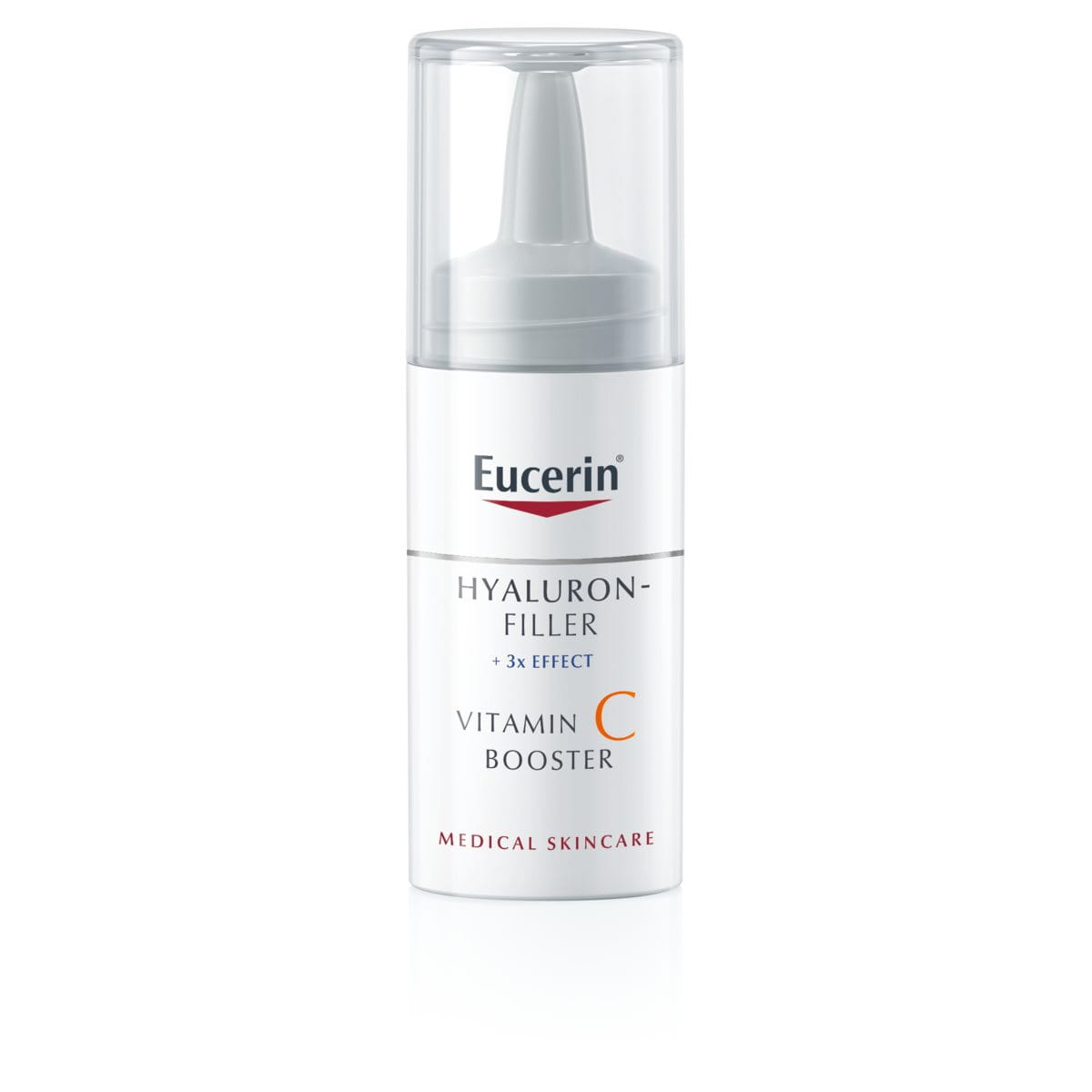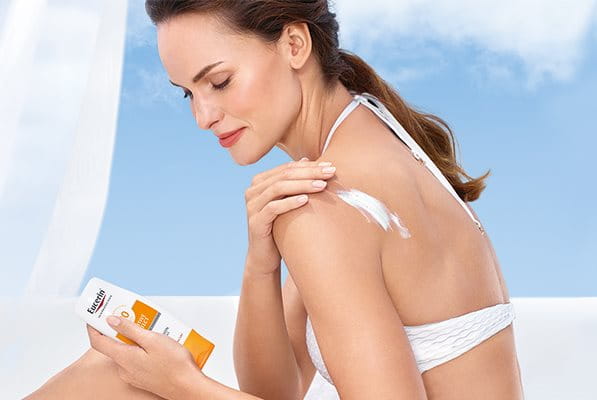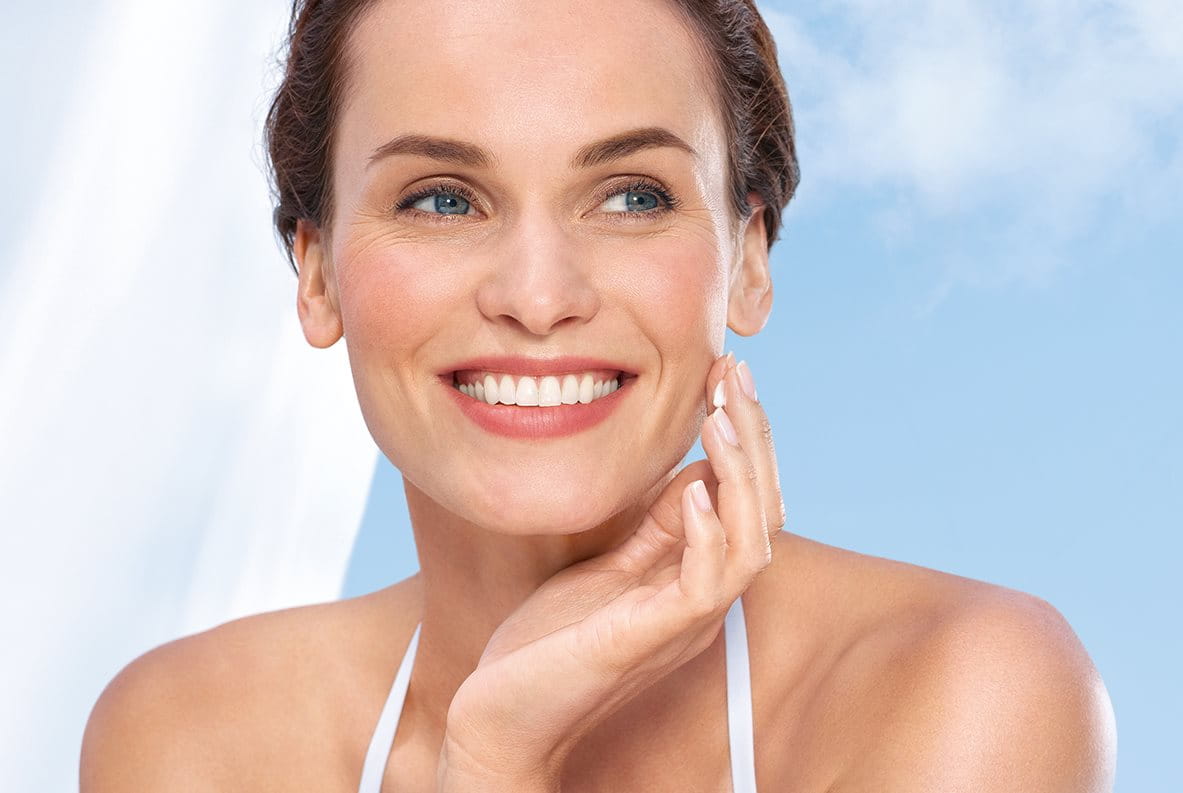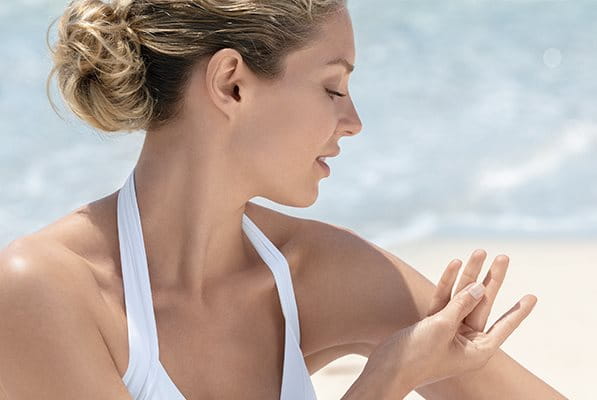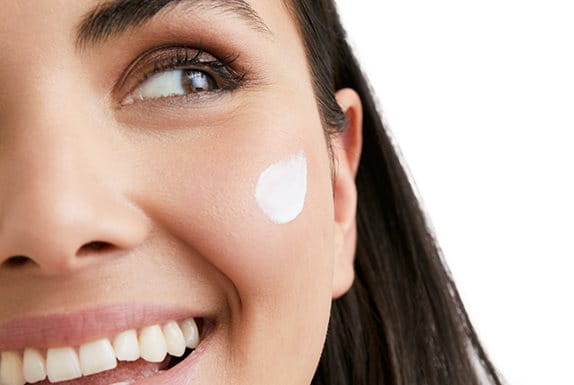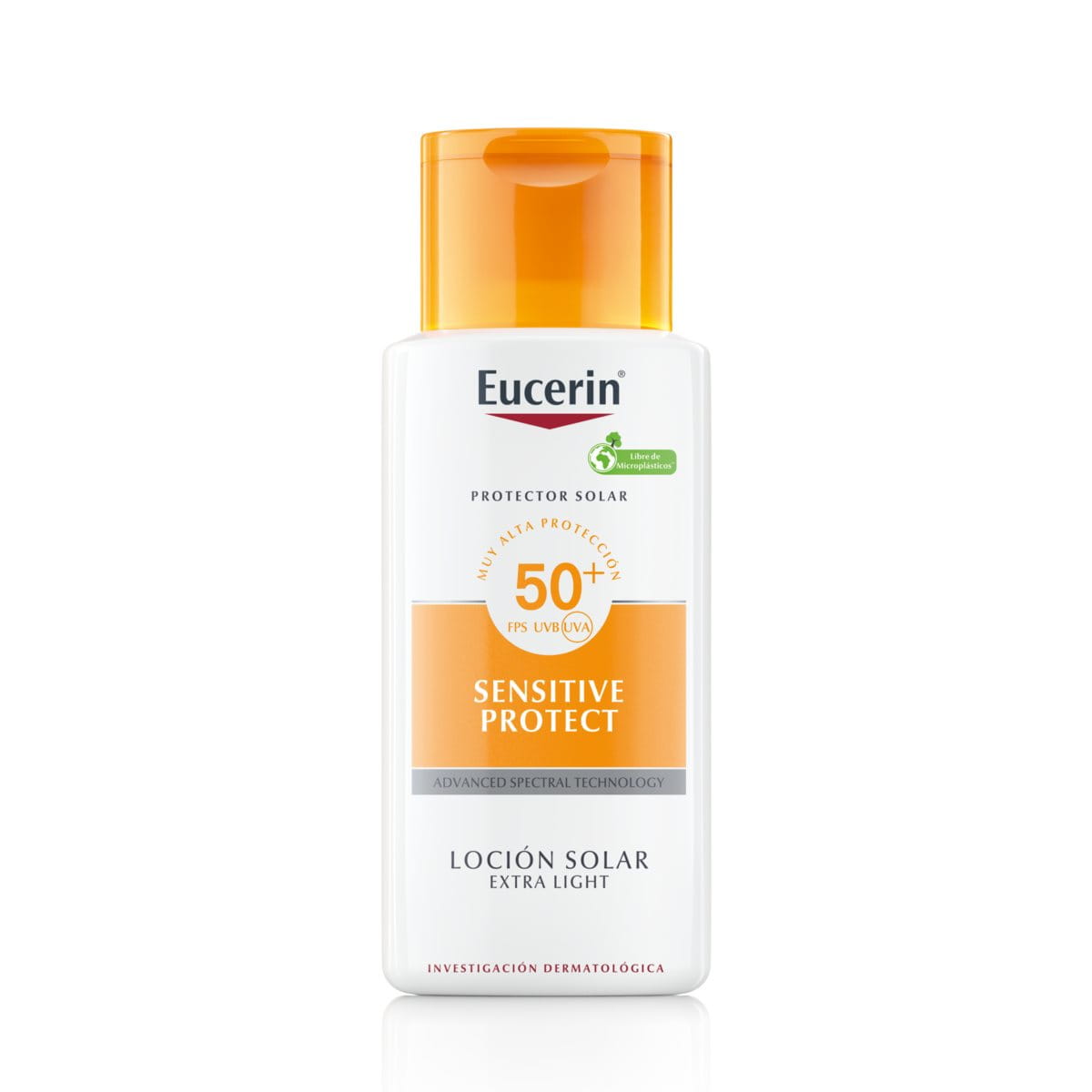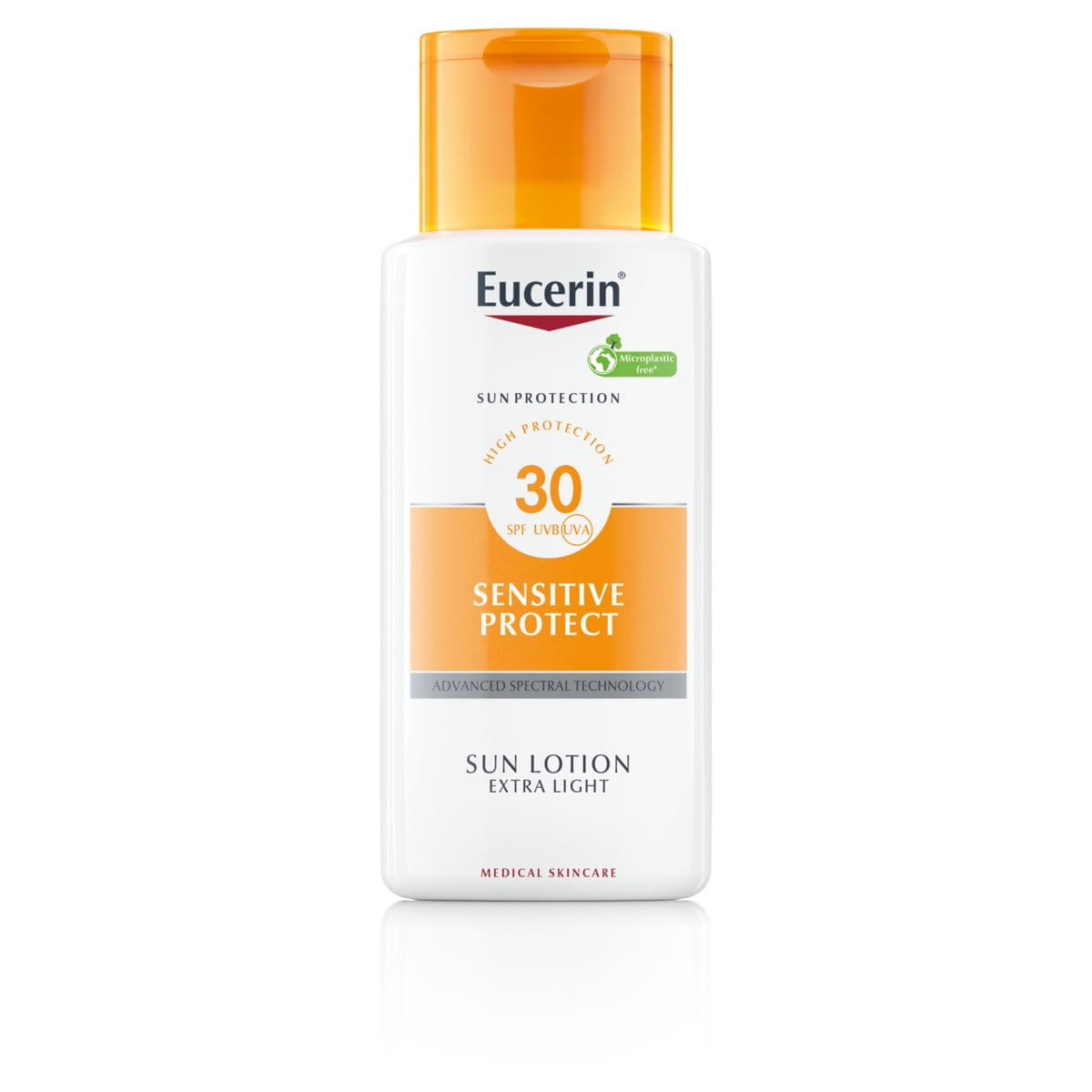Playing outdoors, in the sun, is one of the great pleasures of childhood. Yet we are more aware than ever of the dangers of the sun’s rays, and their growing intensity means that delicate children’s skin needs special protection.
How does the sun effect young skin?
Sun, in moderation, is good for our health but over-exposure to the sun’s rays can cause both short- and long-term skin damage. You can read about how the sun affects skin, both on the surface and at a cellular level, in How do UVA, UVB and HEVIS light rays affect skin?
Young skin is particularly sensitive to sunlight. This is because it is still developing:
Children’s skin is thinner than adult skin
Although it has the same number of layers children’s skin is only one-fifth as thick as adult skin. Skin‘s horny layer (the outermost layer of the epidermis) is thinner and its cells less tightly packed. As a result, its barrier function is less effective, and the sun’s rays are absorbed more quickly and into deeper layers. You can find out more in understanding skin structure and function and understanding skin at different ages.
Skin pigment is less developed in babies and children
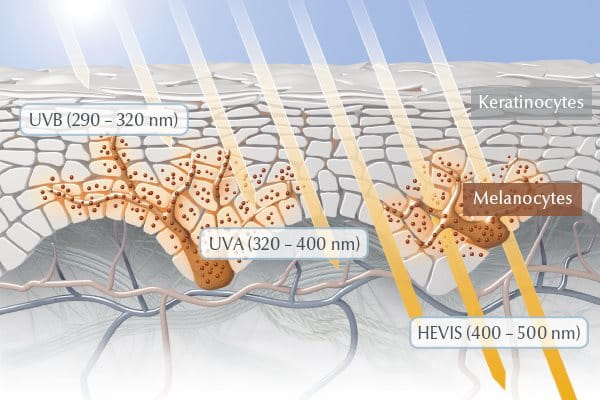
Melanin is the substance that gives our skin its natural color, or pigmentation. When we go out into the sun, our cells produce extra melanin to protect us from getting burnt – it’s what we call ‘tanning’. Children have melanocytes (melanin-producing cells) but they are not fully developed and so their skin has less natural protection from the sun. Children with fair skin, red hair or freckles are more likely to get sunburn, because their skin produces less melanin.


Certain skin conditions, such as Atopic Dermatitis, can also make children’s skin more sensitive to the sun. You can find out more in Sensitive skin: why does it need daily sun protection?
Much of the visible sun damage that we see on our skin when we’re older, for example photoaging (premature skin aging caused by the sun) and issues of hyperpigmentation is a result of over exposure to the sun in our younger years. And, of course, over exposure to the sun can lead to skin diseases such as cancer. Studies indicate that sunburn during childhood can double a person’s risk of skin cancer1.
A sensible attitude to how much sun your child’s skin is exposed to, and the use of sun protections products that support and strengthen skin’s own defenses, will help you to keep their skin healthy.
1 JID 2003, Jun 120(6):1087-1093
How can I protect my baby/child’s skin from the sun?
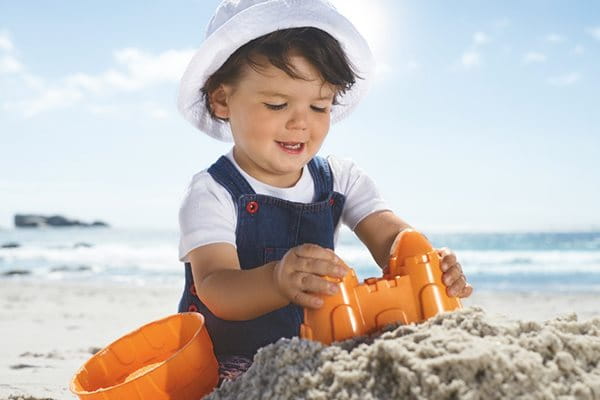

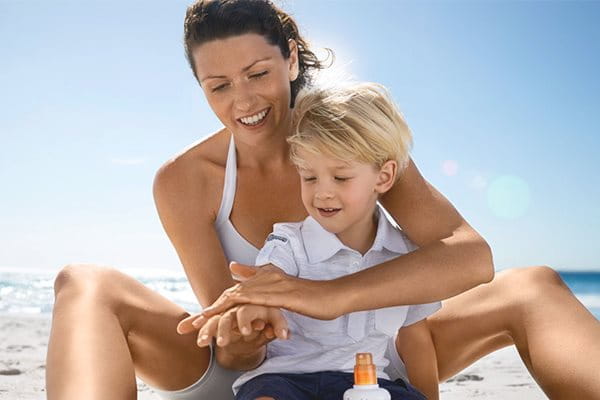
A sensible attitude to the sun will help you to minimize the risk of sun damage to young skin:
- Keep babies and young children out of direct sunlight.
- All children should stay out of the sun at peak hours between 11 am and 3 pm. This is when UVA and UVB rays travel a much shorter path through the earth’s atmosphere, and so are considerably stronger in intensity. Even sunscreens with high SPFs don’t filter 100% of the sun’s rays.
- Cover your child’s skin with protective clothing and/or create shade where there isn’t any by using a sun protection tent.
- Use a very high factor sun protection product to protect their delicate skin. Look out for products that offer UVA and UVB protection and HEVIS light defense.
- Apply sun protection thoroughly and re-apply regularly to ensure you maintain the level of coverage.
- Be mindful of the fact that sun-induced skin damage can occur even before sunburn is visible.
- Remember that, even on cloudy days, UV levels can be high and HEVIS light is present.
- Apply an Afer Sun afer exposure to help care for your child’s skin.
For advice on how to care for adult skin in the sun read Why do I need daily sun protection for my face? and How should I protect my body from the sun?
Important Information
If you baby or child burns their skin in the sun, or if you are in any way concerned about moles on their skin, consult your doctor.
How do I choose the right sun protection product for children?
Look out for products that:
- are specially formulated for young, sensitive skin
- not only protect skin from UVA and UVB rays but also offer HEVIS light defense
- offer the appropriate level of protection for your child’s skin
- are suitable for your child’s skin condition
- match your child’s active lifestyle
Sun protection specially formulated for babies and children
All Eucerin Kids sun products have been specially formulated to protect sensitive young skin from sunburn and sun-induced skin damage. They’re unperfumed, to reduce the risk of skin irritation, and can be used on both face and body. Eucerin Kids products are clinically and dermatologically proven to be effective on, and well tolerated by, sensitive skin.
Eucerin Kids Sun Lotion Sensitive Protect SPF 50+ and Eucerin Kids Mineral Sun Lotion Sensitive Protect SPF 30 are suitable for babies of three months and older. Eucerin Kids Trigger Sun Spray Sensitive Protect SPF 50+, Eucerin Kids Sun Spray Sensitive Protect SPF 50+ and Eucerin Kids Sun Fluid Sensitive Protect SPF 50+ are suitable for use on children of three years and older.
UVA and UVB protection and HEVIS light defense for your baby or child
Four of the Eucerin Kids Sun products include Eucerin’s innovative Advanced Spectral Technology which combines broadband and photostable UVA/UVB filters1 for outstanding UV protection with antioxidant Licochalcone A, a powerful anti-oxidant that works to neutralize free radicals caused by UV and HEVIS light. They also include Glycyrrhetinic Acid which supports skin’s own DNA repair mechanism.
Eucerin Kids Mineral Sun Lotion Sensitive Protect SPF 30 is free from chemical filters and uses a broadband and photostable2 mineral filter system instead.
1 Meeting the high standards for UVA and UVB protection defined by Cosmetics Europe. The levels of UVA protection are higher than the EU recommendation.
2 EU Compliant.
The appropriate level of protection for your baby/child’s skin
Sunscreens are available in four different levels of protection: low (factor 6 to 10), medium (15 to 25), high (30 to 50) and very high (50+). The higher the protection factor the better skin is protected, and we recommend that you always apply high or very high protection sunscreens to young and delicate skin. That’s why all Eucerin Kids Sun products offer high or very high protection.
Sun protection suitable for your child’s skin condition
Atopic Dermatitis is the most common skin disease in childhood3 and young skin benefits from a sun protection product that is suitable for atopic skin such as Eucerin Kids Sun Fluid Sensitive Protect SPF 50+. You can find out more about how to care for your child’s atopic skin in Atopic Dermatitis in babies and children: How to calm and care for young skin.
3 New insights into the epidemiology of childhood atopic dermatitis. Flohr C, Mann J. Allergy. 2014 Jan; 69(1):3-16. Epub 2013 Nov 21
Sun protection that matches your child’s active lifestyle
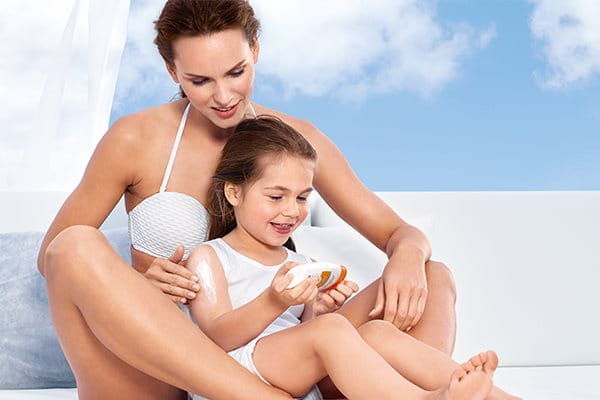
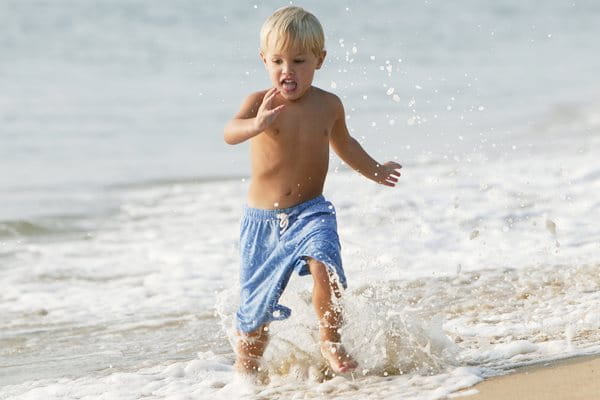
Eucerin Kids sun products come in a range of different formats and sizes making them easy to apply and take with you wherever you go so they’re always to hand. And, because we know how much children can wriggle when you’re applying sun protection, they come with our new ‘Anti-Stain After Wash` technology which helps to reduce the intensity of sunscreen stains after washing.4 You can find out more about it in Sunscreen stains: how can I protect clothes from yellow marks? All our children’s sun protection products are extra water-resistant so they can keep up with your child’s active lifestyle.
4 In the following children’s products: Eucerin Kids Sun Lotion Extra Light Sensitive Protect SPF 50+, Eucerin Kids Sun Lotion Sensitive Protect SPF 50+, Eucerin Kids Sun Spray Sensitive Protect SPF 50+.
How should I apply sun protection to children?
Using sufficient product, applying it thoroughly and reapplying it regularly is key to keeping your child safe in the sun:
What is the right amount of product for a child?
It’s important to apply sun protection generously. A recent Eucerin study5 revealed that 88% of parents use less than the recommended amount of product on their children. The right amount obviously depends on their size, the number of areas that need covering and on the format of the product:
Lotion or fluid
Use your palm to measure how much to apply: a thick line of product the length of your middle finger counts as one measure. As a general rule, we recommend:
- Age 3-5: Use a measure to a measure and a half of product for each of the areas (2-11) on the diagram below. Use twice the amount for the face and neck (area 1).
- Age 6+: Use two measures of product for each of the areas (1-11) on the diagram below. Rub the product in to ensure all areas are full covered.
Pump spray
For each of the numbered areas on the body diagram below we recommend you vary the number of sprays according to age:
- Age 3-5: Approximately 5 pumps per area
- Age 6-10: Between 7 and 10 pumps per area
- Age 10+: Between 10 and 15 pumps per area
The pump can be held quite close to the body. When applying product to the face, first spray it into the palm of your hand and then gently apply to your child’s face.
Trigger spray
Again, for each of the numbered areas on the body diagram below we recommend you vary the amount of spray according to age:
- Age 3-5: Approximately 3 sprays of product per area
- Age 6-10: Between 3 and 5 sprays per area
- Age 10+: Between 4 and 7 sprays per area
The can be held quite close to the body. When applying product to the face, first spray it into the palm of your hand and then gently apply to your child’s face.
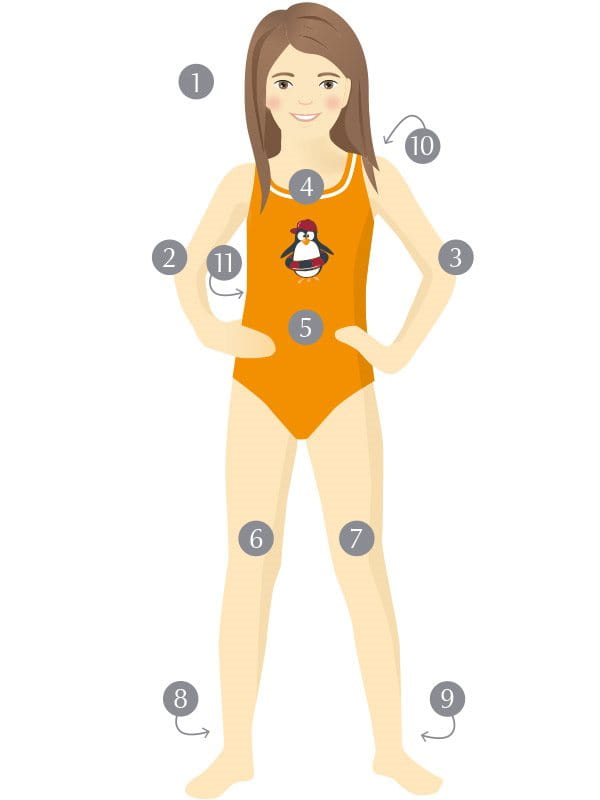
- 1 Face and neck
- 2 & 3 Both arms
- 4 Chest
- 5 Stomach
- 6 & 7 The top of your legs (front and back)
- 8 & 9 The bottom of your legs (front and back) plus your feet
- 10 Shoulders and upper back
- 11 Lower back
Why is it important to apply and reapply sun protection thoroughly and regularly?
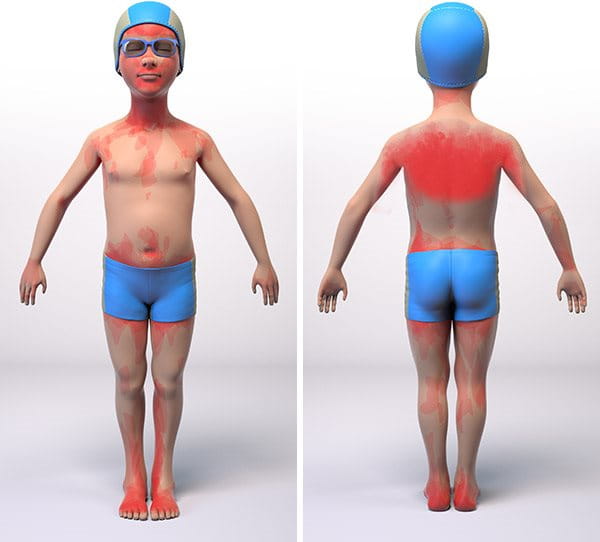

Some parts are easy to miss and then burn quickly. Don’t forget behind the ears, the back of the neck, the back and shoulders as well as hands and feet, the backs of the arms and the areas at the edges of your child’s swimwear.
The results of Eucerin research5 into how effectively sun cream is applied to children were mapped onto an avatar. The research found that, on average, 6.6% of a child’s total body was insufficiently protected in the sun. The red in the diagram below indicates the areas least well covered with sunscreen, and the intensity of redness varies depending on the number of children who were not properly protected in that area.
Even though Eucerin Kids sun products are extra water-resistant, we recommend that you reapply at least every two hours (and more if they’re in and out of the water) to maintain the initial levels of protection.
5 Beiersdorf study `Sunscreen application routine and UV protective behavior of parents’, D. Roggencamp et al, published at 27th EADV Congress 2018 Paris, France. Poster No. P1684. Sample of 17 children and 17 adults who applied the product to their child.
A superior sun protection product, applied thoroughly and regularly, combined with a sensible approach to how long your child spends in the sun will help you to keep them happy and ensure their skin is healthy now and in the future.
Our brand values

We deliver a holistic dermo-cosmetic approach to protect your skin, keep it healthy and radiant.

For over 100 years, we have dedicated ourselves to researching and innovating in the field of skin science. We believe in creating active ingredients and soothing formulas with high tolerability that work to help you live your life better each day.

We work together with leading dermatologist and pharmacist partners around the world to create innovative and effective skincare products they can trust and recommend.


